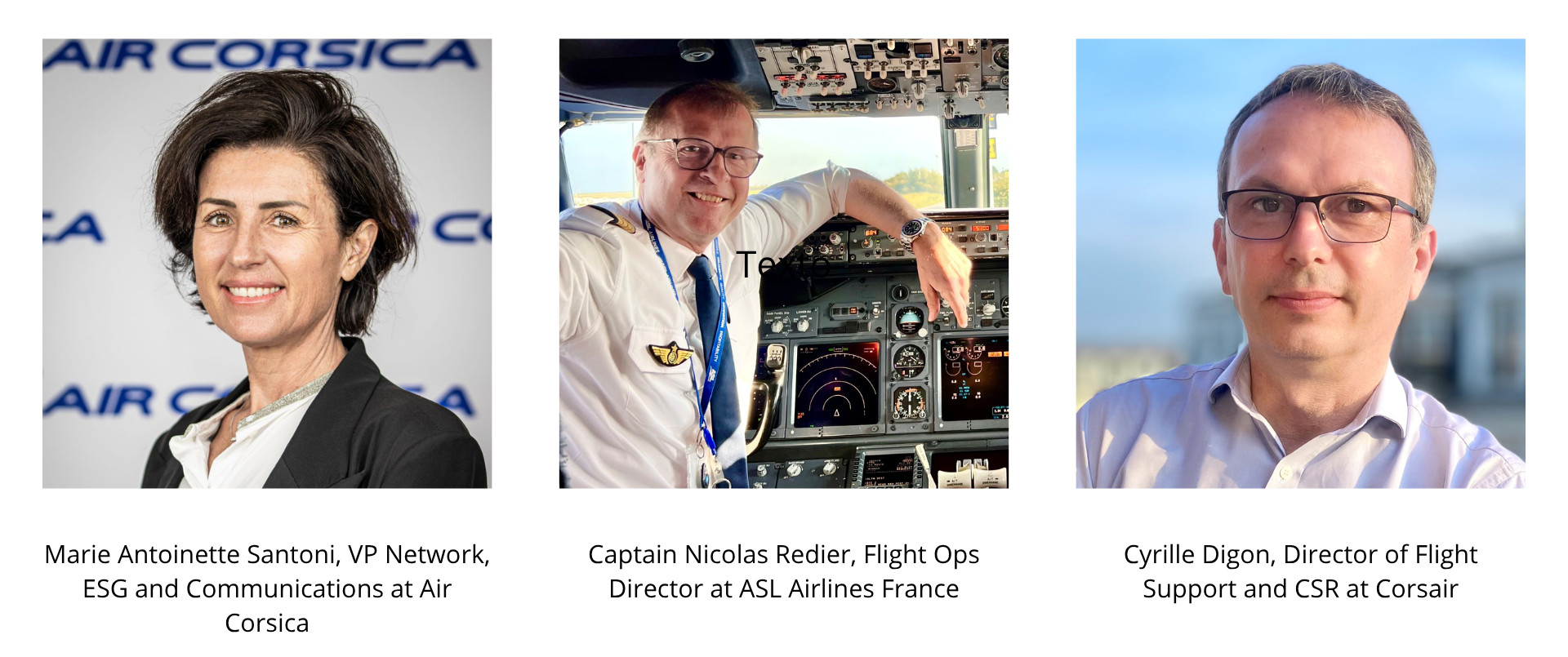
To meet the aviation industry’s ambitious goal of net-zero CO2 by 2050, airlines are investing in decarbonization measures such as Sustainable Aviation Fuel (SAF), more efficient aircraft and operational efficiencies. But you cannot manage what you don’t measure. Therefore, a vital consideration is the transparent and accurate provision of CO2 emissions data from flights, for both passengers and cargo.
In 2022, IATA launched CO2 Connect, a powerful tool to support aviation’s decarbonization, driven by global standard methodologies and high-quality data. With the contribution of more than 70 airlines today, the tool has been established as the benchmark for measuring aviation emissions globally.
French airlines are among the key players leading the way. We spoke to three airlines—Corsair, Air Corsica and ASL Airlines France—that have recently joined the CO2 Connect program to understand how the tool is helping them.

Marie Antoinette Santoni, VP Network, ESG and Communications at Air Corsica notes that the airline industry’s commitment to net-zero, together with regulations introduced by the EU, requires the airline to rethink its operations to reduce its carbon footprint. “This means investing in a newer fleet of aircraft—with 85% of the fleet renewed, we have seen a 16% reduction in CO2 emissions—cleaner technologies and optimizing our routes to consume less fuel and reduce our CO2 emissions.”
“For the moment, it means additional costs, charges and taxes. SAF, which is a solution, is not available in the market and is too expensive. And the ReFuelEU anti-tankering provisions are unfairly onerous and costly to airlines serving smaller regional airports across Europe,” says Captain Nicolas Redier, Flight Ops Director at ASL Airlines France.
“The growing body of European regulations reflects a strong commitment to transformation, but their implementation poses significant operational and economic challenges for our sector,” says Cyrille Digon, Director of Flight Support and CSR at Corsair.
But overall, the airlines are firmly committed to reducing their environmental impact and complying with the regulations, says Santoni.
“CO2 Connect, using the IATA methodology, provides standardized, verifiable, and comparable data. Contributing our data is part of our commitment to reducing the overall emissions from aviation,” says Digon.
Captain Redier from ASL Airlines France, highlights that CO2 emission reduction is a commitment for the whole aviation industry. “CO2 Connect is a common tool for a common target. Working together in the same direction makes our efforts more efficient and accurate.”
“The data provided by CO2 Connect, in accordance with the IATA methodology, is essential for establishing an accurate and credible picture of our emissions reduction efforts. It not only allows us to track our progress, but also enables us to communicate transparently with our customers and partners about our environmental impact,” says Air Corsica’s Santoni.
“Yes, we plan to soon integrate CO2 Connect across all our customer segments—flying passengers, corporate clients, and cargo—to enhance environmental transparency. Our intention is to make it available directly on our website, allowing customers to easily access and monitor their carbon footprint,” says Digon.
Santoni notes that Air Corsica recognizes the importance of transparency regarding its carbon footprint. “We are currently considering integrating CO2 Connect into our services to provide our passengers and business customers with clear visibility into the emissions associated with their travel. This could help them make more informed decisions when choosing more sustainable flight options.”
“It is a key driver,” says Digon, “Alongside fleet modernization, to achieve net-zero objectives. The increasing use of SAF, and soon e-SAF, must be properly reflected and valued in emissions accounting methodologies.”
“SAF represents a tangible solution for reducing CO2 emissions from aviation. The inclusion of SAF in CO2 Connect emissions calculations is crucial to achieving our net-zero targets. We are closely monitoring technological developments and hope that the production of these new fuels will enable us to increasingly integrate them into our consumption,” says Santoni at Air Corsica.
> Learn more on IATA CO2 Connect